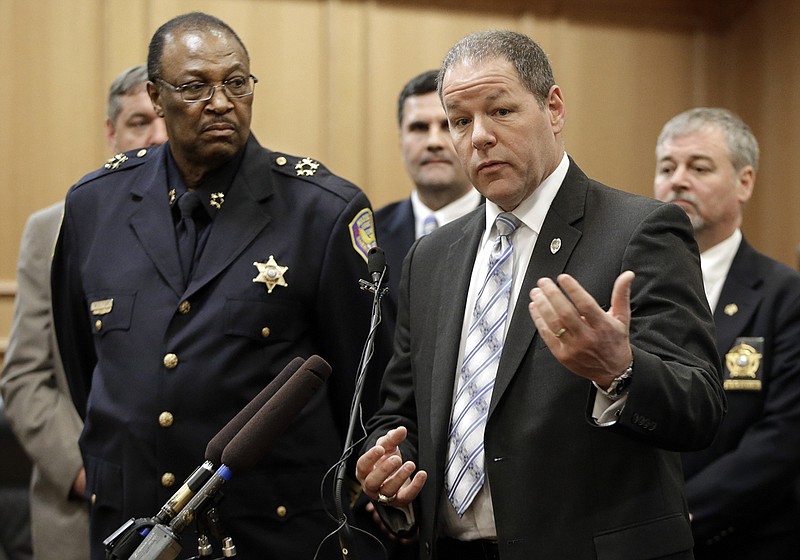NASHVILLE - Tennessee law enforcement agencies seized almost $86 million in cash from 2009 to 2014 through use of state civil forfeiture laws allowing the money to be confiscated without criminal charges - let alone convictions, according to a new report.
The total take is likely even higher since figures don't include values of real or personal property such as cars and boats taken, according to the report, issued by the Institute for Justice, a libertarian public-interest law firm.
And that's not counting another $69 million Tennessee police agencies received between 2000 and 2013 through a U.S. Department of Justice asset-splitting program known as equitable sharing. That was enough to win Tennessee the 26th place in the national rankings on equitable sharing. Agencies also got another $10 million or so from another joint federal asset seizure program. Add them all up and state law enforcement agencies have received at least $165 million since 2000.
The state's civil forfeiture laws now have earned Tennessee something else: It's a D- grade from the Institute for Justice in its report, "Policing for Profit: The Abuse of Civil Asset Forfeiture."
Calling Tennessee's policies "appalling," the report takes aim at the Volunteer State. And not just here, but other states, including Georgia and Alabama, which also got D- grades. A total of 36 states had laws rated below C.
So what's the problem? Critics contend such laws provide financial incentives for law enforcement to take someone's property and use the money to self-fund operations with little oversight. That creates the potential for abuse.
"Research has shown that the financial incentives baked into civil forfeiture laws influence law enforcement behavior," said Dr. Dick M. Carpenter II, the Institute of Justice's director of strategic research and one of the report's co-authors. "When laws make taking property relatively easy and lucrative for law enforcement, it should be no surprise to see agencies take advantage."
Information on law enforcement seizures in Tennessee was compiled by the Nashville-based Beacon Center for the Institute through state Open Records Act requests.
The controversy is already playing out in the Tennessee Legislature, where concerns were aired last month in a Senate Judiciary Committee hearing. Some lawmakers are readying legislation to place restrictions on police, such as requiring them to use criminal laws, which have tougher standards for proof than civil procedures where a preponderance of evidence is enough.
Prosecutors, however, defended use of civil forfeiture laws, saying they strike a blow at huge profit-making criminal operations while simultaneously funding crime-fighting efforts. During the October hearing, Shelby County Assistant Prosecutor Steve Jones, who works with the West Tennessee Violent Crime and Drug Task Force, argued that allowing the use of criminal proceeds to fund law enforcement is "government at its very best."
He warned against changing the policy, saying, "If you want to make a difference for our communities, take away criminal proceeds forfeiture funding. You'll make a huge difference; it just won't be a positive difference. The criminals will thank you."
That didn't sit well with Sen. Mike Bell, R-Riceville, who said the goal is to "protect the innocent who are occasionally caught up in this system."
"It's almost like you were trying to set up that you're either for us or you're for the criminals," Bell said.
Knoxville Police Chief David Rausch, head of the Tennessee Association of Chiefs of Police, urged lawmakers not to base policy on what he called rare cases of abuse.
"It seems that many in our country are jumping on knee-jerk reactionary bandwagons that are the result of isolated incidents that may get misrepresented," he said.
In an interview Wednesday, Bell said that while he had not seen the Institute for Justice's report "the numbers can't help but raise concern among me and my fellow legislators and citizens. I've heard concerns from many constituents who want to see the legislature address this issue."
But, he noted, "where we go and how it's addressed, that's still to be determined."
Bell recalled an example Lt. Col. Tracy Trott of the Tennessee Highway Patrol cited in the hearing where agency officers found huge sums of cash wrapped in plastic and hidden in water-filled tanks. Both the driver and owner of the truck said they had no knowledge the money was there.
"When no one wants to claim the money, I think a reasonable person can claim that seizure is legal," Bell said. While Bell doesn't plan to sponsor legislation, he said he's pretty sure Senate Judiciary Committee Chairman Brian Kelsey, R-Germantown, is. During the hearing, Kelsey questioned whether it would disrupt any direct issue of policing for profit by having seizure proceeds go first into the state's general fund. Then lawmakers could appropriate money back to law enforcement agencies instead of being kept by them on the front end.
Jones resisted the idea, saying it would lead to "governmental red tape."
"You would call it that," Kelsey said as he raised the issue of oversight. "But we would call it the legislative process."
Contact Andy Sher at asher@timesfreepress.com, 615-255-0550 or follow on twitter at AndySher1.




